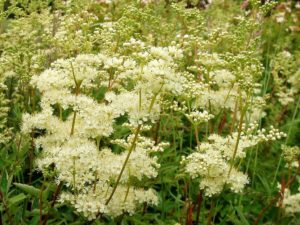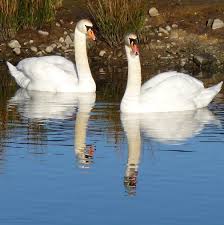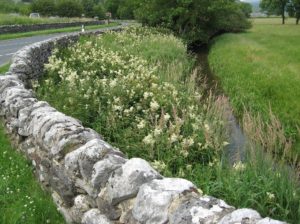Richard Lutz grabs a handful of meadowsweet and delivers his last food parcel.

It’s the time of meadowsweet. That’s it above. It joins early raspberries, purple orchids and late campion in the fields and lanes.
Its fragrance is sublime, a combination of perfume and a baby’s soft neck. And, as I grab a handful, I know it’s full summer. Meadowsweet goes by a ton of names: lily of the meadow, bridewort, queen of the meadow and, more mundanely and boringly, dollof.
To conjure up its warm delicious smell, let me point out that it was used in the old-timey days as stuffing for bedding and floor coverings to cloak more suspicious odours – thus its usage as a strewing herb. You took a whole bunch of the fluffy flower and strew it around your place. It makes home sweet home just that more sweet. It was Queen Elizabeth’s favourite herb back in the day. Here in Britain, it’s seen right through July and August along the country roadsides that wind through this green island:
On a more worldly note, I am completing my last round of food deliveries to the elderly of the Scottish village of Strathcarrick. Yes, meadowsweet blesses the lanes, the paths and the fields. And Lockdown has eased. It seems the public wants it that way, a sweeter way of living. So more folks, who kept to themselves like a warm glove, are now getting out more. It’s time to stop my rounds.
i walk on The Beach Road. A pair of mute swans follows me in the rumbly baywater. If I make a turn towards them on the shore, they seem to have an inner radar and they veer five or ten degrees away. Somewhere in rushes or marshes, their tiny grey cygnet babies are waiting for their maiden voyage.
 The parent swans patrol and are quiet as silk; they glide effortlessly, then plunge their white curved necks into the bay for food. They are easily the most elegant birds around, unlike the chattering oystercatchers, the cawing gulls, the twittering something or others. Further out in the bay, a gannet, like a dive bomber, knifes unto the water, leaving a small explosion of white water.
The parent swans patrol and are quiet as silk; they glide effortlessly, then plunge their white curved necks into the bay for food. They are easily the most elegant birds around, unlike the chattering oystercatchers, the cawing gulls, the twittering something or others. Further out in the bay, a gannet, like a dive bomber, knifes unto the water, leaving a small explosion of white water.
I leave the food at The McD door. Alma tells me Ed, frail and thin as wrapping paper, had to be taken to the old folks home for extra care. There’ll be no need for the Times. Alma smiles, her mouth like a steel blade and adds: “…for a while…”
Ed was the only customer in Strathcarrick to get the Times with its hefty metro-financial news from London. He was in the farm machinery rental business. Around here, that’s a quite a corner to control. The Cormach Estates will rent out the two upper fields above the village for barley, that’s sub-leased to the Nethermains Farms which, in turn, contracts out to the crews who plough and harvest and use Ed’s giant machines. Everyone uses Ed’s machines, But now, he’s getting that extra care and now I notice that Alma’s lip is twitching. She’ll visit Ed every day. Maybe there’s even been a call or two about the business during these crucial summer months.
Further on to the homes of Margaret-1 and, down the road, Margaret-2. One gives me a farewell thank you note and the other an envelope with £10.25 in cash for the weekly bill. I take them back to Paul’s Village Shop and mix up the handover. Paul gets the thank you note and I’m left with the £10.25. It’ll get sortedout tomorrow when I go into the shop with my mask and patiently wait in line with the others two metres apart as the papers, milk, eggs, turnips and cigarettes get bought and sold.
And tomorrow, my career as a delivery man over, I may take in the new place in town. It’s The Harbour Cafe down at the harbour. It’s been talked about a lot. The Russian spy report and the twisting covid stories are shoved aside, taking a back seat. Word has it there’ll be latte coffee and almond croissants at The Harbour Cafe at the harbour. And maybe a light white wine too as that evening sun goes down..down at The Harbour Cafe at the harbour.




I too am finishing my food deliveries from my local community centre Bridgend Farmhouse near Edinburgh.
From the end of the month, folk will have to manage for themselves, we’ve run out of money and all the volunteers are going back to work.
I can see it all now even from the States
I want to go to the harbor cafe! Dang it!
The big city must begin to feel like another time and another world